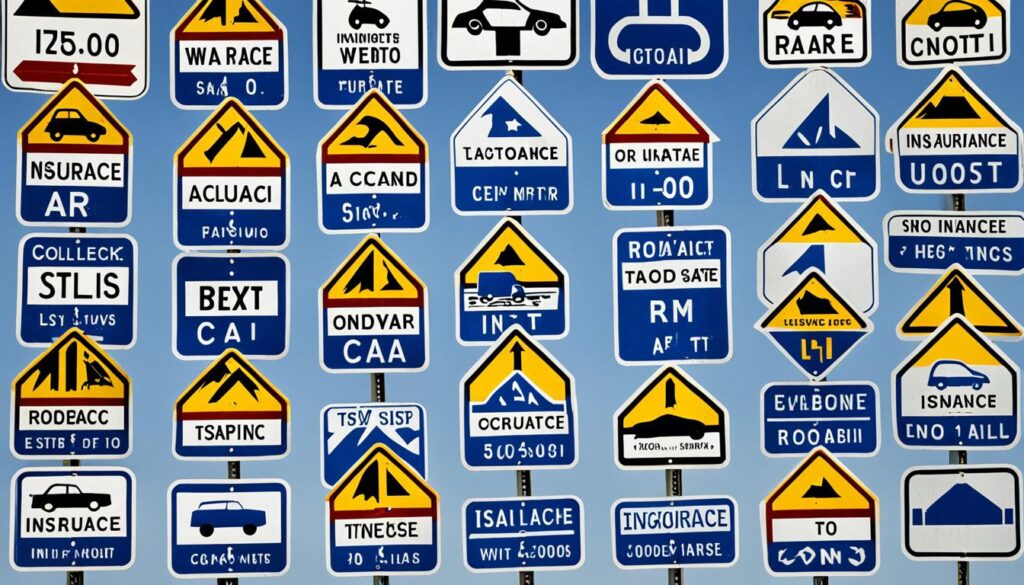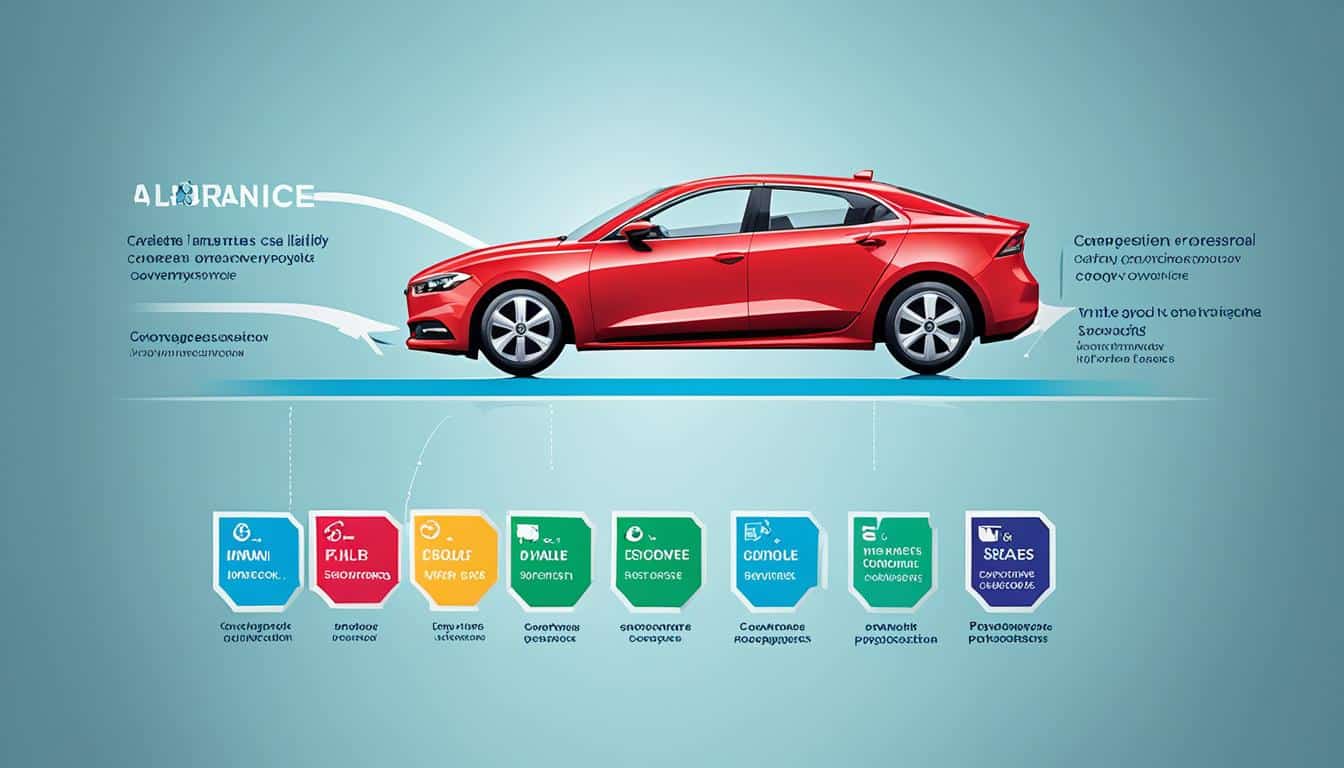Welcome to our comprehensive guide on car insurance. Whether you’re a new driver or a seasoned one, having a good understanding of car insurance is essential for protecting yourself and your vehicle. In this guide, we’ll cover everything you need to know about car insurance, from coverage options to rates and tips to save on your policy.
Car insurance provides financial coverage and protection in the event of accidents, theft, or damage to your vehicle. It is a contract between you and an insurance company, where you pay regular premiums in exchange for the insurer’s promise to pay for covered losses.
- Understanding the basics of car insurance is crucial for every driver.
- Car insurance provides financial coverage in case of accidents, theft, or damage.
- Choosing the right coverage options is essential for comprehensive protection.
- Understanding insurance rates and how they are determined can help you make informed decisions.
- Saving money on car insurance is possible through discounts and smart strategies.
What is Car Insurance?
Car insurance is a type of coverage that provides financial protection in the event of accidents, theft, or damage to your vehicle. It serves as a contract between you (the policyholder) and an insurance company, ensuring that you are financially protected against unforeseen circumstances.
Auto insurance coverage offers various types of protection, allowing you to choose the level of coverage that suits your needs.
Insurance companies play a crucial role in the car insurance process. They assess your risk profile and provide coverage based on factors such as your driving history, the make and model of your vehicle, and other relevant information. Insurance companies manage claims, handle policy renewals, and provide support and guidance throughout the policy term.
“Car insurance is not just a legal requirement in most states, it is also a vital financial safeguard. It protects you from potential financial losses associated with accidents, vehicle damage, or legal liabilities.”
Types of Car Insurance Coverage
When it comes to car insurance, there are several types of coverage available:
- Liability coverage: This type of coverage helps pay for any damages or injuries caused to others in an accident where you are at fault.
- Collision coverage: Collision coverage helps cover the cost of repairing or replacing your vehicle if it is damaged in a collision, regardless of fault.
- Comprehensive coverage: Comprehensive coverage protects against damage to your vehicle that is not caused by a collision, such as theft, vandalism, or natural disasters.
- Medical payments coverage: This coverage helps pay for medical expenses related to injuries sustained in an accident, regardless of fault.
- Uninsured/underinsured motorist coverage: This coverage helps protect you if you are involved in an accident with a driver who does not have insurance or does not have enough insurance to cover the damages.
It’s crucial to choose the right coverage options for your specific needs to ensure adequate protection.
Determining Your Insurance Needs
When it comes to car insurance, it’s essential to determine your specific coverage needs. By understanding your insurance needs, you can make informed decisions to protect yourself, your vehicle, and your finances. Here are some key factors to consider:
1. Car Insurance Coverage Options
Car insurance coverage options vary, so it’s important to evaluate and select the ones that suit your needs. Common coverage options include:
- Liability Coverage: This protects you if you’re responsible for causing injuries or property damage in an accident.
- Collision Coverage: This coverage helps pay for damages to your vehicle in the event of a collision, regardless of fault.
- Comprehensive Coverage: Comprehensive coverage provides protection against non-collision incidents, such as theft, vandalism, or natural disasters.
- Uninsured/Underinsured Motorist Coverage: This coverage helps cover expenses if you’re involved in an accident with a driver who doesn’t have insurance or doesn’t have enough coverage.
By considering your individual circumstances and needs, you can select the coverage options that provide the right level of protection for you.
2. Deductible Amount
Another important factor in determining your insurance needs is the deductible amount. A deductible is the amount you’re responsible for paying out of pocket before your insurance coverage kicks in. Generally, higher deductibles result in lower premiums, while lower deductibles lead to higher premiums. It’s crucial to strike a balance between affordable premiums and a deductible amount that you can comfortably afford in the event of a claim.
3. Customizable Car Insurance Policies
Many insurance companies offer customizable car insurance policies that allow you to personalize your coverage. Customization options may include adding roadside assistance, rental car reimbursement, or increasing the limits of your coverage. By carefully reviewing and selecting these options, you can tailor your policy to meet your specific needs and budget.
Remember that determining your insurance needs is a personal decision based on your circumstances. Take the time to research and compare different coverage options, deductibles, and customization choices before making a final decision. This way, you can ensure that your car insurance policy provides the right level of protection for you and your vehicle.

“By understanding your insurance needs, you can make informed decisions to protect yourself, your vehicle, and your finances.”
Understanding Insurance Rates
When it comes to car insurance rates, understanding the factors that influence them is crucial. Insurance providers consider various aspects of your driving history and personal circumstances to determine the rate you’ll pay. Let’s explore these factors, their impact on insurance rates, and the average cost of car insurance.
The Impact of Driving History
Your driving history plays a significant role in determining your car insurance rate. Insurance providers assess factors such as accidents, violations, and claims you’ve made in the past. If you have a clean driving record with no incidents, you’re likely to enjoy lower insurance rates. However, a history of accidents or traffic violations may lead to higher premiums.
Other Factors Affecting Insurance Rates
Aside from driving history, several other factors can influence your insurance rate. These can include:
- Your age and gender: Younger and less experienced drivers typically face higher insurance rates compared to older, more experienced individuals.
- Location: The area where you live, particularly its crime and accident rates, can impact your insurance rate. Urban areas often have higher rates due to increased chances of accidents or theft.
- Vehicle type: The make and model of your car can affect your insurance rate. Expensive or high-performance vehicles may have higher premiums due to higher repair costs or increased risk of theft.
- Credit score: Your credit history may be considered by some insurance providers as an indicator of your financial responsibility. A lower credit score can lead to higher rates.
Considering these factors, it’s essential to maintain a good driving record, choose your vehicle wisely, and be mindful of where you live to help secure more favorable car insurance rates.
Average Cost of Car Insurance
The average cost of car insurance can vary based on several factors, including the ones mentioned above. According to the Insurance Information Institute, the average annual cost of car insurance in the United States was approximately $1,004 in 2019. However, it’s essential to note that individual rates may differ significantly depending on personal circumstances and the level of coverage selected.

| State | Average Annual Cost of Car Insurance |
|---|---|
| California | $1,846 |
| Texas | $1,489 |
| Florida | $1,643 |
| New York | $1,369 |
Table: Average Annual Cost of Car Insurance by State (2019 data)
These figures provide a broad overview of average costs and can serve as a reference point when analyzing insurance rates. However, it’s essential to request personalized quotes from multiple insurance companies to obtain accurate pricing based on your specific situation.
Saving Money on Car Insurance
When it comes to car insurance, finding ways to save money is always a priority. With the rising costs of auto insurance, it’s essential to explore various discounts and strategies that can help you lower your premiums and maximize your insurance savings. In this section, we’ll provide you with practical tips on how to save money on car insurance.
1. Take Advantage of Insurance Discounts
One of the most effective ways to save on auto insurance is by taking advantage of insurance discounts. Many insurance companies offer a range of discounts that can significantly reduce your premiums. Common discounts include:
- Safe driver discount
- Multi-vehicle discount
- Good student discount
- Bundle discount for combining auto and home insurance
- Low mileage discount
Make sure you inquire about all the available discounts when shopping for insurance to ensure you’re getting the best possible rate.
2. Improve Your Driving Habits
Your driving history plays a significant role in determining your car insurance rates. By maintaining a clean driving record and avoiding accidents or traffic violations, you can potentially qualify for lower premiums. Additionally, consider enrolling in defensive driving courses to demonstrate your commitment to safe driving and potentially receive an additional discount.
3. Increase Your Deductible
Another way to save on auto insurance is by increasing your deductible—the amount you’ll pay out of pocket in the event of a claim. By opting for a higher deductible, you’re assuming more risk, but you’ll generally enjoy lower monthly premiums. However, be sure to choose a deductible amount that you can comfortably afford in case you need to file a claim.
4. Shop Around and Compare Rates
Insurance rates can vary significantly from one provider to another, so it’s important to shop around and compare rates from different companies. Request quotes from multiple insurers and evaluate the coverage options and discounts they offer. By taking the time to compare rates, you can find the most affordable insurance policy that meets your needs.
Understanding Different Types of Coverage
When it comes to car insurance policies, it’s essential to understand the different types of coverage available to ensure you have the right level of protection. Here, we’ll explore three key coverages: liability coverage, collision coverage, and property damage, as well as highlight the importance of additional coverages for comprehensive protection.
Liability Coverage
Liability coverage is a fundamental component of car insurance policies. It provides financial protection if you are found responsible for an accident, covering the costs of property damage and bodily injury sustained by others involved in the incident. This coverage is required in most states as it helps ensure that all parties involved in an accident can receive appropriate compensation.
Collision Coverage
In the event of a collision with another vehicle or object, collision coverage helps cover the cost of repairing or replacing your own vehicle, regardless of who is at fault. This coverage is particularly important if you have a valuable or newer vehicle, as the cost of repairs or replacement can be substantial.
Property Damage
Property damage coverage provides protection for any damage caused by your vehicle to someone else’s property, such as their vehicle, fences, or buildings. It allows you to cover the cost of repairing or replacing the damaged property, ensuring that you are not held personally liable for the expenses.
Additional Coverages
While liability, collision, and property damage coverages are vital, additional coverages can provide extra layers of protection. Some common additional coverages include:
- Comprehensive Coverage: This coverage protects against non-collision incidents such as theft, vandalism, fire, or natural disasters.
- Medical Payments: Medical payment coverage helps cover medical expenses for you and your passengers in the event of an accident, regardless of who is at fault.
- Uninsured/Underinsured Motorist: This coverage safeguards you if you are involved in an accident with a driver who has insufficient or no insurance coverage.
- Rental Reimbursement: If your car is being repaired after an accident, rental reimbursement coverage can help cover the cost of a rental vehicle.
By considering these additional coverages, you can tailor your car insurance policy to meet your individual needs and provide enhanced protection, ensuring you have peace of mind on the road.
Now that we have explored the various types of coverage available in car insurance policies, we can delve deeper into choosing the right insurance company for your needs in the next section.
| Coverage | Description |
|---|---|
| Liability Coverage | Protects against financial loss if you are responsible for an accident |
| Collision Coverage | Covers the cost of repairing or replacing your vehicle after a collision |
| Property Damage | Covers damage caused to someone else’s property by your vehicle |
| Additional Coverages | Offers extra layers of protection, such as comprehensive coverage, medical payments, uninsured/underinsured motorist coverage, and rental reimbursement |

Choosing the Right Insurance Company
When it comes to selecting an insurance company for your car insurance needs, it’s essential to consider factors such as reputation, customer service, and coverage options. Among the popular insurance companies in the market, State Farm, Geico, Liberty Mutual, and Allstate stand out for their commitment to providing quality service and comprehensive coverage.
State Farm, founded in 1922, is one of the largest insurance companies in the United States. Known for its reliable customer service and competitive rates, State Farm offers a wide range of coverage options to meet the diverse needs of policyholders. Whether you’re looking for liability coverage, collision coverage, or additional coverages like roadside assistance, State Farm has you covered.
Geico, on the other hand, is recognized for its affordable rates and user-friendly online platform. With a strong emphasis on technology, Geico allows policyholders to manage their car insurance policies conveniently. Offering various coverage options, including liability coverage, collision coverage, and rental reimbursement, Geico is a popular choice for those seeking affordable and customizable car insurance plans.
Liberty Mutual, founded in 1912, is another prominent insurance company that offers a wide range of coverage options. With a focus on personalized service and innovative solutions, Liberty Mutual aims to provide comprehensive protection to its policyholders. From liability coverage to comprehensive coverage, Liberty Mutual ensures that you have peace of mind on the road.
“Allstate, founded in 1931, is known for its strong customer satisfaction ratings and extensive network of local agents. With a wide array of coverage options available, including liability coverage, collision coverage, and personal injury protection, Allstate strives to meet the unique needs of its policyholders.” – Insurance Expert
Choosing the right insurance company ultimately depends on your individual preferences and requirements. It’s important to consider factors such as pricing, coverage options, and customer reviews to make an informed decision. Take the time to research and compare insurance companies to find the one that aligns with your needs and priorities.
| Insurance Company | Reputation | Customer Service | Coverage Options |
|---|---|---|---|
| State Farm | Excellent | Highly Rated | Comprehensive |
| Geico | Good | Efficient | Customizable |
| Liberty Mutual | Reputable | Responsive | Diverse |
| Allstate | Well-Established | Satisfactory | Extensive |
Filing a Car Insurance Claim
When an accident occurs, it’s crucial to have a clear understanding of how to file a car insurance claim. Taking prompt action and following the correct procedures can help ensure a smooth and efficient claims process.
The Importance of Reporting Accidents Promptly
Whether it’s a minor fender bender or a major collision, it’s important to report the accident to your insurance company as soon as possible. Reporting accidents promptly allows your insurer to start the claims process and gather all necessary information. Delaying the reporting could result in complications and potential denial of your claim.
Also Read:- Protecting Your Future: The Importance Of Safety Insurance
The Steps Involved in Filing a Claim
When filing a car insurance claim, there are certain steps that you need to follow:
- Document the incident: Gather all relevant information about the accident, such as the location, date, time, and any involved parties. Take photos of the damage and gather witness statements, if possible.
- Contact your insurance company: Reach out to your insurance provider’s claims department to report the accident. Have your policy number and all incident details ready.
- Provide necessary documentation: Your insurance company will require supporting documents to process your claim. This may include a copy of the police report, repair estimates, and any medical records if injuries were sustained.
- Cooperate with the claims adjuster: Your insurance company will assign a claims adjuster to evaluate the damage and determine the coverage. Cooperate fully with the adjuster and provide any requested information promptly.
- Review the settlement offer: Once the claims adjuster has assessed the damage, they will provide a settlement offer. Carefully review the offer and ask for clarification if needed. If you agree with the settlement, you can proceed with the claim closure. If not, you can negotiate or dispute the offer.
Availability of Emergency Road Services
When filing a car insurance claim, it’s important to note that many insurance companies offer emergency road services as part of their policies. These services can provide assistance in case of breakdowns, tire changes, and other roadside emergencies. Contact your insurance company to inquire about the availability of emergency road services and utilize them if needed.
Remember, the process of filing a car insurance claim may vary slightly depending on your insurance provider and policy. It’s always a good idea to review your specific policy terms and conditions or contact your insurance agent for guidance.

Understanding State-Specific Requirements
When it comes to car insurance, it’s important to understand that the requirements can vary from state to state. Each state has its own set of insurance policies, coverage options, and insurance discounts. Therefore, it’s crucial to familiarize yourself with the specific regulations in the state you live in to ensure that you have the right coverage that meets the legal requirements.
Insurance policies in different states can vary in terms of the minimum coverage requirements. For example, some states may require higher liability coverage limits, while others may have specific requirements for additional coverages like uninsured/underinsured motorist protection. By understanding the insurance policies specific to your state, you can ensure that you have the right level of coverage to protect you and your vehicle.
Moreover, coverage options can also differ from one state to another. Some states may offer no-fault coverage, which means that your insurance company will pay for your medical expenses and other damages regardless of who is at fault in an accident. Other states may operate on a fault-based system, where the at-fault driver’s insurance is responsible for covering the damages. Understanding the coverage options available in your state can help you make informed decisions about the type of coverage you need.

Insurance discounts, too, can vary by state. Insurance providers often offer various discounts, such as safe driver discounts, multi-policy discounts, and good student discounts, to help you save on your insurance premiums. However, the availability and eligibility for these discounts may differ depending on the state you live in. By understanding the insurance discounts specific to your state, you can take advantage of potential savings and find ways to make your insurance more affordable.
To ensure that you have the right coverage and take advantage of relevant insurance discounts, it’s crucial to research and become familiar with the state-specific requirements. By doing so, you can make informed decisions about your car insurance policy and ensure that you comply with your state’s regulations.
Conclusion
After exploring the comprehensive guide to car insurance, it is clear that obtaining car insurance quotes is crucial for finding the best coverage options. Whether you are looking for vehicle insurance, cheap car insurance, or affordable car insurance, comparing quotes from different providers allows you to make an informed decision.
Remember, car insurance is not just a legal requirement, but it also provides financial protection in case of accidents, theft, or other unforeseen events. By understanding your insurance needs, researching insurance rates, and taking advantage of available discounts, you can save money while ensuring comprehensive coverage.
Choosing the right insurance company, such as State Farm, Geico, Liberty Mutual, or Allstate, is equally important. Consider factors like reputation, customer service, and coverage options when making your decision.
FAQs
Welcome to our comprehensive guide on car insurance. Whether you’re a new driver or a seasoned one, having a good understanding of car insurance is essential for protecting yourself and your vehicle. In this guide, we’ll cover everything you need to know about car insurance, from coverage options to rates and tips to save on your policy.
Car insurance provides financial coverage and protection in the event of accidents, theft, or damage to your vehicle. It is a contract between you and an insurance company, where you pay regular premiums in exchange for the insurer’s promise to pay for covered losses.
- Understanding the basics of car insurance is crucial for every driver.
- Car insurance provides financial coverage in case of accidents, theft, or damage.
- Choosing the right coverage options is essential for comprehensive protection.
- Understanding insurance rates and how they are determined can help you make informed decisions.
- Saving money on car insurance is possible through discounts and smart strategies.
What is Car Insurance?
Car insurance is a type of coverage that provides financial protection in the event of accidents, theft, or damage to your vehicle. It serves as a contract between you (the policyholder) and an insurance company, ensuring that you are financially protected against unforeseen circumstances.
Auto insurance coverage offers various types of protection, allowing you to choose the level of coverage that suits your needs.
Insurance companies play a crucial role in the car insurance process. They assess your risk profile and provide coverage based on factors such as your driving history, the make and model of your vehicle, and other relevant information. Insurance companies manage claims, handle policy renewals, and provide support and guidance throughout the policy term.
“Car insurance is not just a legal requirement in most states, it is also a vital financial safeguard. It protects you from potential financial losses associated with accidents, vehicle damage, or legal liabilities.”
Types of Car Insurance Coverage
When it comes to car insurance, there are several types of coverage available:
- Liability coverage: This type of coverage helps pay for any damages or injuries caused to others in an accident where you are at fault.
- Collision coverage: Collision coverage helps cover the cost of repairing or replacing your vehicle if it is damaged in a collision, regardless of fault.
- Comprehensive coverage: Comprehensive coverage protects against damage to your vehicle that is not caused by a collision, such as theft, vandalism, or natural disasters.
- Medical payments coverage: This coverage helps pay for medical expenses related to injuries sustained in an accident, regardless of fault.
- Uninsured/underinsured motorist coverage: This coverage helps protect you if you are involved in an accident with a driver who does not have insurance or does not have enough insurance to cover the damages.
It’s crucial to choose the right coverage options for your specific needs to ensure adequate protection.
Determining Your Insurance Needs
When it comes to car insurance, it’s essential to determine your specific coverage needs. By understanding your insurance needs, you can make informed decisions to protect yourself, your vehicle, and your finances. Here are some key factors to consider:
1. Car Insurance Coverage Options
Car insurance coverage options vary, so it’s important to evaluate and select the ones that suit your needs. Common coverage options include:
- Liability Coverage: This protects you if you’re responsible for causing injuries or property damage in an accident.
- Collision Coverage: This coverage helps pay for damages to your vehicle in the event of a collision, regardless of fault.
- Comprehensive Coverage: Comprehensive coverage provides protection against non-collision incidents, such as theft, vandalism, or natural disasters.
- Uninsured/Underinsured Motorist Coverage: This coverage helps cover expenses if you’re involved in an accident with a driver who doesn’t have insurance or doesn’t have enough coverage.
By considering your individual circumstances and needs, you can select the coverage options that provide the right level of protection for you.
2. Deductible Amount
Another important factor in determining your insurance needs is the deductible amount. A deductible is the amount you’re responsible for paying out of pocket before your insurance coverage kicks in. Generally, higher deductibles result in lower premiums, while lower deductibles lead to higher premiums. It’s crucial to strike a balance between affordable premiums and a deductible amount that you can comfortably afford in the event of a claim.
3. Customizable Car Insurance Policies
Many insurance companies offer customizable car insurance policies that allow you to personalize your coverage. Customization options may include adding roadside assistance, rental car reimbursement, or increasing the limits of your coverage. By carefully reviewing and selecting these options, you can tailor your policy to meet your specific needs and budget.
Remember that determining your insurance needs is a personal decision based on your circumstances. Take the time to research and compare different coverage options, deductibles, and customization choices before making a final decision. This way, you can ensure that your car insurance policy provides the right level of protection for you and your vehicle.

“By understanding your insurance needs, you can make informed decisions to protect yourself, your vehicle, and your finances.”
Understanding Insurance Rates
When it comes to car insurance rates, understanding the factors that influence them is crucial. Insurance providers consider various aspects of your driving history and personal circumstances to determine the rate you’ll pay. Let’s explore these factors, their impact on insurance rates, and the average cost of car insurance.
The Impact of Driving History
Your driving history plays a significant role in determining your car insurance rate. Insurance providers assess factors such as accidents, violations, and claims you’ve made in the past. If you have a clean driving record with no incidents, you’re likely to enjoy lower insurance rates. However, a history of accidents or traffic violations may lead to higher premiums.
Other Factors Affecting Insurance Rates
Aside from driving history, several other factors can influence your insurance rate. These can include:
- Your age and gender: Younger and less experienced drivers typically face higher insurance rates compared to older, more experienced individuals.
- Location: The area where you live, particularly its crime and accident rates, can impact your insurance rate. Urban areas often have higher rates due to increased chances of accidents or theft.
- Vehicle type: The make and model of your car can affect your insurance rate. Expensive or high-performance vehicles may have higher premiums due to higher repair costs or increased risk of theft.
- Credit score: Your credit history may be considered by some insurance providers as an indicator of your financial responsibility. A lower credit score can lead to higher rates.
Considering these factors, it’s essential to maintain a good driving record, choose your vehicle wisely, and be mindful of where you live to help secure more favorable car insurance rates.
Average Cost of Car Insurance
The average cost of car insurance can vary based on several factors, including the ones mentioned above. According to the Insurance Information Institute, the average annual cost of car insurance in the United States was approximately $1,004 in 2019. However, it’s essential to note that individual rates may differ significantly depending on personal circumstances and the level of coverage selected.

| State | Average Annual Cost of Car Insurance |
|---|---|
| California | $1,846 |
| Texas | $1,489 |
| Florida | $1,643 |
| New York | $1,369 |
Table: Average Annual Cost of Car Insurance by State (2019 data)
These figures provide a broad overview of average costs and can serve as a reference point when analyzing insurance rates. However, it’s essential to request personalized quotes from multiple insurance companies to obtain accurate pricing based on your specific situation.
Saving Money on Car Insurance
When it comes to car insurance, finding ways to save money is always a priority. With the rising costs of auto insurance, it’s essential to explore various discounts and strategies that can help you lower your premiums and maximize your insurance savings. In this section, we’ll provide you with practical tips on how to save money on car insurance.
1. Take Advantage of Insurance Discounts
One of the most effective ways to save on auto insurance is by taking advantage of insurance discounts. Many insurance companies offer a range of discounts that can significantly reduce your premiums. Common discounts include:
- Safe driver discount
- Multi-vehicle discount
- Good student discount
- Bundle discount for combining auto and home insurance
- Low mileage discount
Make sure you inquire about all the available discounts when shopping for insurance to ensure you’re getting the best possible rate.
2. Improve Your Driving Habits
Your driving history plays a significant role in determining your car insurance rates. By maintaining a clean driving record and avoiding accidents or traffic violations, you can potentially qualify for lower premiums. Additionally, consider enrolling in defensive driving courses to demonstrate your commitment to safe driving and potentially receive an additional discount.
3. Increase Your Deductible
Another way to save on auto insurance is by increasing your deductible—the amount you’ll pay out of pocket in the event of a claim. By opting for a higher deductible, you’re assuming more risk, but you’ll generally enjoy lower monthly premiums. However, be sure to choose a deductible amount that you can comfortably afford in case you need to file a claim.
4. Shop Around and Compare Rates
Insurance rates can vary significantly from one provider to another, so it’s important to shop around and compare rates from different companies. Request quotes from multiple insurers and evaluate the coverage options and discounts they offer. By taking the time to compare rates, you can find the most affordable insurance policy that meets your needs.
Understanding Different Types of Coverage
When it comes to car insurance policies, it’s essential to understand the different types of coverage available to ensure you have the right level of protection. Here, we’ll explore three key coverages: liability coverage, collision coverage, and property damage, as well as highlight the importance of additional coverages for comprehensive protection.
Liability Coverage
Liability coverage is a fundamental component of car insurance policies. It provides financial protection if you are found responsible for an accident, covering the costs of property damage and bodily injury sustained by others involved in the incident. This coverage is required in most states as it helps ensure that all parties involved in an accident can receive appropriate compensation.
Collision Coverage
In the event of a collision with another vehicle or object, collision coverage helps cover the cost of repairing or replacing your own vehicle, regardless of who is at fault. This coverage is particularly important if you have a valuable or newer vehicle, as the cost of repairs or replacement can be substantial.
Property Damage
Property damage coverage provides protection for any damage caused by your vehicle to someone else’s property, such as their vehicle, fences, or buildings. It allows you to cover the cost of repairing or replacing the damaged property, ensuring that you are not held personally liable for the expenses.
Additional Coverages
While liability, collision, and property damage coverages are vital, additional coverages can provide extra layers of protection. Some common additional coverages include:
- Comprehensive Coverage: This coverage protects against non-collision incidents such as theft, vandalism, fire, or natural disasters.
- Medical Payments: Medical payment coverage helps cover medical expenses for you and your passengers in the event of an accident, regardless of who is at fault.
- Uninsured/Underinsured Motorist: This coverage safeguards you if you are involved in an accident with a driver who has insufficient or no insurance coverage.
- Rental Reimbursement: If your car is being repaired after an accident, rental reimbursement coverage can help cover the cost of a rental vehicle.
By considering these additional coverages, you can tailor your car insurance policy to meet your individual needs and provide enhanced protection, ensuring you have peace of mind on the road.
Now that we have explored the various types of coverage available in car insurance policies, we can delve deeper into choosing the right insurance company for your needs in the next section.
| Coverage | Description |
|---|---|
| Liability Coverage | Protects against financial loss if you are responsible for an accident |
| Collision Coverage | Covers the cost of repairing or replacing your vehicle after a collision |
| Property Damage | Covers damage caused to someone else’s property by your vehicle |
| Additional Coverages | Offers extra layers of protection, such as comprehensive coverage, medical payments, uninsured/underinsured motorist coverage, and rental reimbursement |

Choosing the Right Insurance Company
When it comes to selecting an insurance company for your car insurance needs, it’s essential to consider factors such as reputation, customer service, and coverage options. Among the popular insurance companies in the market, State Farm, Geico, Liberty Mutual, and Allstate stand out for their commitment to providing quality service and comprehensive coverage.
State Farm, founded in 1922, is one of the largest insurance companies in the United States. Known for its reliable customer service and competitive rates, State Farm offers a wide range of coverage options to meet the diverse needs of policyholders. Whether you’re looking for liability coverage, collision coverage, or additional coverages like roadside assistance, State Farm has you covered.
Geico, on the other hand, is recognized for its affordable rates and user-friendly online platform. With a strong emphasis on technology, Geico allows policyholders to manage their car insurance policies conveniently. Offering various coverage options, including liability coverage, collision coverage, and rental reimbursement, Geico is a popular choice for those seeking affordable and customizable car insurance plans.
Liberty Mutual, founded in 1912, is another prominent insurance company that offers a wide range of coverage options. With a focus on personalized service and innovative solutions, Liberty Mutual aims to provide comprehensive protection to its policyholders. From liability coverage to comprehensive coverage, Liberty Mutual ensures that you have peace of mind on the road.
“Allstate, founded in 1931, is known for its strong customer satisfaction ratings and extensive network of local agents. With a wide array of coverage options available, including liability coverage, collision coverage, and personal injury protection, Allstate strives to meet the unique needs of its policyholders.” – Insurance Expert
Choosing the right insurance company ultimately depends on your individual preferences and requirements. It’s important to consider factors such as pricing, coverage options, and customer reviews to make an informed decision. Take the time to research and compare insurance companies to find the one that aligns with your needs and priorities.
| Insurance Company | Reputation | Customer Service | Coverage Options |
|---|---|---|---|
| State Farm | Excellent | Highly Rated | Comprehensive |
| Geico | Good | Efficient | Customizable |
| Liberty Mutual | Reputable | Responsive | Diverse |
| Allstate | Well-Established | Satisfactory | Extensive |
Filing a Car Insurance Claim
When an accident occurs, it’s crucial to have a clear understanding of how to file a car insurance claim. Taking prompt action and following the correct procedures can help ensure a smooth and efficient claims process.
The Importance of Reporting Accidents Promptly
Whether it’s a minor fender bender or a major collision, it’s important to report the accident to your insurance company as soon as possible. Reporting accidents promptly allows your insurer to start the claims process and gather all necessary information. Delaying the reporting could result in complications and potential denial of your claim.
Also Read:- Protecting Your Future: The Importance Of Safety Insurance
The Steps Involved in Filing a Claim
When filing a car insurance claim, there are certain steps that you need to follow:
- Document the incident: Gather all relevant information about the accident, such as the location, date, time, and any involved parties. Take photos of the damage and gather witness statements, if possible.
- Contact your insurance company: Reach out to your insurance provider’s claims department to report the accident. Have your policy number and all incident details ready.
- Provide necessary documentation: Your insurance company will require supporting documents to process your claim. This may include a copy of the police report, repair estimates, and any medical records if injuries were sustained.
- Cooperate with the claims adjuster: Your insurance company will assign a claims adjuster to evaluate the damage and determine the coverage. Cooperate fully with the adjuster and provide any requested information promptly.
- Review the settlement offer: Once the claims adjuster has assessed the damage, they will provide a settlement offer. Carefully review the offer and ask for clarification if needed. If you agree with the settlement, you can proceed with the claim closure. If not, you can negotiate or dispute the offer.
Availability of Emergency Road Services
When filing a car insurance claim, it’s important to note that many insurance companies offer emergency road services as part of their policies. These services can provide assistance in case of breakdowns, tire changes, and other roadside emergencies. Contact your insurance company to inquire about the availability of emergency road services and utilize them if needed.
Remember, the process of filing a car insurance claim may vary slightly depending on your insurance provider and policy. It’s always a good idea to review your specific policy terms and conditions or contact your insurance agent for guidance.

Understanding State-Specific Requirements
When it comes to car insurance, it’s important to understand that the requirements can vary from state to state. Each state has its own set of insurance policies, coverage options, and insurance discounts. Therefore, it’s crucial to familiarize yourself with the specific regulations in the state you live in to ensure that you have the right coverage that meets the legal requirements.
Insurance policies in different states can vary in terms of the minimum coverage requirements. For example, some states may require higher liability coverage limits, while others may have specific requirements for additional coverages like uninsured/underinsured motorist protection. By understanding the insurance policies specific to your state, you can ensure that you have the right level of coverage to protect you and your vehicle.
Moreover, coverage options can also differ from one state to another. Some states may offer no-fault coverage, which means that your insurance company will pay for your medical expenses and other damages regardless of who is at fault in an accident. Other states may operate on a fault-based system, where the at-fault driver’s insurance is responsible for covering the damages. Understanding the coverage options available in your state can help you make informed decisions about the type of coverage you need.

Insurance discounts, too, can vary by state. Insurance providers often offer various discounts, such as safe driver discounts, multi-policy discounts, and good student discounts, to help you save on your insurance premiums. However, the availability and eligibility for these discounts may differ depending on the state you live in. By understanding the insurance discounts specific to your state, you can take advantage of potential savings and find ways to make your insurance more affordable.
To ensure that you have the right coverage and take advantage of relevant insurance discounts, it’s crucial to research and become familiar with the state-specific requirements. By doing so, you can make informed decisions about your car insurance policy and ensure that you comply with your state’s regulations.
Conclusion
After exploring the comprehensive guide to car insurance, it is clear that obtaining car insurance quotes is crucial for finding the best coverage options. Whether you are looking for vehicle insurance, cheap car insurance, or affordable car insurance, comparing quotes from different providers allows you to make an informed decision.
Remember, car insurance is not just a legal requirement, but it also provides financial protection in case of accidents, theft, or other unforeseen events. By understanding your insurance needs, researching insurance rates, and taking advantage of available discounts, you can save money while ensuring comprehensive coverage.
Choosing the right insurance company, such as State Farm, Geico, Liberty Mutual, or Allstate, is equally important. Consider factors like reputation, customer service, and coverage options when making your decision.
FAQs
Q: What is auto insurance?
A: Auto insurance is a type of insurance that provides financial protection for your vehicle in case of accidents, theft, or other damages.
Q: How can I save on my car insurance?
A: You can save on your car insurance by comparing rates from different providers, taking advantage of discounts, and maintaining a good driving record.
Q: How do I get a car insurance quote?
A: You can get a car insurance quote by contacting insurance companies directly, using online comparison tools, or speaking with an insurance agent.
Q: What are some common questions about car insurance?
A: Common questions about car insurance include inquiries about coverage options, deductibles, discounts, and how to file a claim.
Q: Can I customize my car insurance policy?
A: Yes, you can customize your car insurance policy to fit your specific needs by adding or removing coverage options and adjusting deductibles.
Q: What kind of car insurance should I get?
A: The type of car insurance you need depends on factors such as your driving habits, the value of your vehicle, and any legal requirements in your area.
Q: How can I bundle home and auto insurance?
A: You can bundle home and auto insurance by purchasing both policies from the same insurance company, which often results in a discount on your premiums.
Q: How can I compare car insurance rates?
A: You can compare car insurance rates by getting quotes from multiple insurance companies and evaluating the coverage options and prices they offer.





